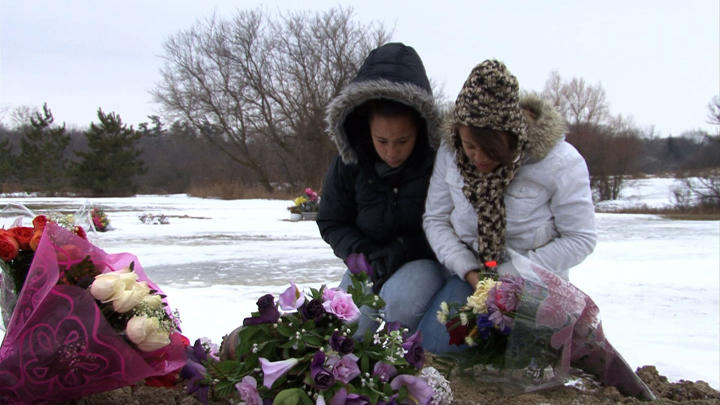Still from "In the Name of the Family."
In the Name of the Family
Directed by Shelley Saywell
Women Make Movies, 2010
Shelley Saywell’s "In the Name of the Family" provides an in-depth investigation of “honor killings” of girls in Muslim immigrant families. The documentary tells the story of three North American teenagers (Aqsa Parvez along with sisters Amina and Sarah Said) and one college student (Fauzia Muhammad), who were all victims of honor killings by male members of their family. Fauzia Muhammad was the only one among them who survived.
The documentary begins with testimonials from Aqsa’s friends, explaining how her father was from Pakistan and inveighed against her request to remove her hijab. Friends noted that Aqsa was torn between her new culture and that of her ancestors. One friend says: “They bring us to Canada and when we start to adapt to the culture, they get upset.” The mother of one of Aqsa’s friends testifies that Aqsa’s father had threatened his daughter: “If you behave this way, I swear on the Quran I’ll kill you.” This same mother insists: “It isn’t about religion. It’s all about their specific culture. Her family was from a rural area. We’re from the city. We’re not conservative like them.”
And then we are told the story of the premeditated murder of Amina and Sara Said, daughters of Patricia, an American woman, and Said, an Egyptian. As the girls grew up, their father would become violent whenever they wore tight clothing or had boyfriends. In the end, he murdered both of his daughters and fled the country. Fauzia Muhammad, the college student from Afghanistan who survived her brother’s attempt to murder her, recounts how her brother stabbed her over and over again as her mother watched.
The documentary is interspersed with testimonials of people insisting that these honor killings have nothing to do with Islam, but rather stem from the families’ traditional cultures. For example, we hear the testimony of one youth who claims that after Aqsa’s murder Muslims had to face the same prejudice they experienced following 9/11. And one of the local sheikhs insists: “This was a case of domestic violence, not Islam.” Most testimonials focus on clashes between American life and the cultural background of Muslim immigrants, and how those lead to the killings. The documentary ends with a written statement saying that the UN estimates there are 5,000 honor killings per year.
"In the Name of the Family" makes it clear that honor killings are not sanctioned by Islam, but does not explain that these killings arise instead from ancient tribal notions of honor and family shame, which call for male members of the family to murder women when they engage in illicit sexual behavior. Further explanation would have been necessary in order to convincingly dissassociate honor killings from Islam. Additionally, the film leaves the viewer with the notion that there is something inherently violent in Eastern culture. The film explores the tension that arises when immigrants try to adapt their lifestyles to the West while still remaining culturally Eastern – and thus, to me the story was more about cultural tensions, and violent, criminal fathers, who resort to killing their daughters. Contrary to the director’s intention, the film serves to “other” Islam by making it seem like this violence is somehow a part of Eastern culture.
This article appeared in Al Jadid Magazine, Vol. 17, No. 65, 2011.
Copyright © 2012 AL JADID MAGAZINE

